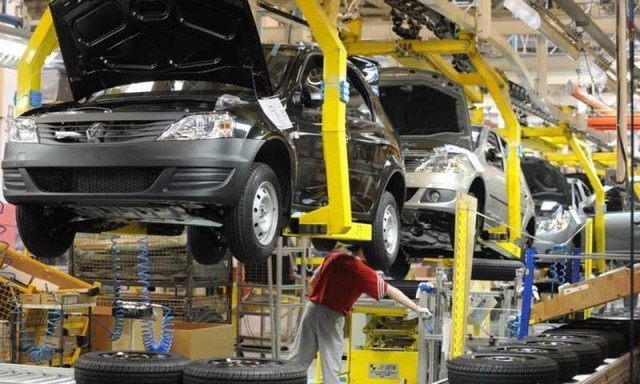Renault, Nissan, Mitsubishi rule out merger
Double down on plan to cooperate on car production to save costs

A car manufacturing plant. PHOTO: AFP
The companies have been hit hard by the coronavirus pandemic just as they were trying to rework their partnership following the arrest of its chief architect, Carlos Ghosn, who had been pushing for a merger despite stiff resistance from Nissan.
The new plan, which entails cutting the alliance’s vehicle ranges by a fifth, pooling manufacturing by region and capitalising on joint designs, is meant to serve as a peace treaty, sources told Reuters.
“We do not need a merger to be efficient,” Renault Chairman Jean-Dominique Senard told a joint news conference. He also said existing ties with Germany’s Daimler, which owns Mercedes-Benz, could be strengthened and that he hoped to make an announcement in the coming weeks.
Renault and Nissan were among the weakest global automakers going into the coronavirus crisis and had lacked a clear plan for using their alliance to emerge from the slump and share the burden of investing in electric vehicles and other technology.
Rivals such as Peugeot and Fiat Chrysler have been pushing ahead with plans to share costs and designs while the two biggest carmakers, Volkswagen and Toyota, already operate as single units.
Renault shares, which have been depressed by tensions with Nissan and the French carmaker’s first loss in a decade in 2019, surged by almost 20% following Wednesday’s announcements. Daimler shares jumped as much as 10% while Nissan closed 5.5% higher.
Renault is also on course to receive €5 billion ($5.5 billion) in French state aid, although the government wants it to keep car manufacturing in France in return.
Leader-follower
Under their new plan, the alliance aims to make savings by sharing production in a so-called leader-follower system, with one company leading for a certain type of vehicle and geography with others piggy-backing on the designs and manufacturing.
Senard said that would help cut costs, with joint savings on future compact sports utility vehicles (SUVs) coming to €2 billion ($2.2 billion).
In Brazil, for example, the new approach means the alliance will go from making six models on four platforms - or underlying vehicle architectures - to seven models on one platform. A tighter design and development process at the alliance, whose best-known cars include the Renault Clio compact hatchback, the Nissan Rogue crossover SUV and the Mitsubishi Outlander SUV, would reduce its total number of models by 20% by 2025 from well over 80 now.
Some analysts pointed to potential problems, however, saying the three companies remained locked in a partnership while some larger rivals were not constrained by structural limitations.
Published in The Express Tribune, May 28th, 2020.
Like Business on Facebook, follow @TribuneBiz on Twitter to stay informed and join in the conversation.



















COMMENTS
Comments are moderated and generally will be posted if they are on-topic and not abusive.
For more information, please see our Comments FAQ